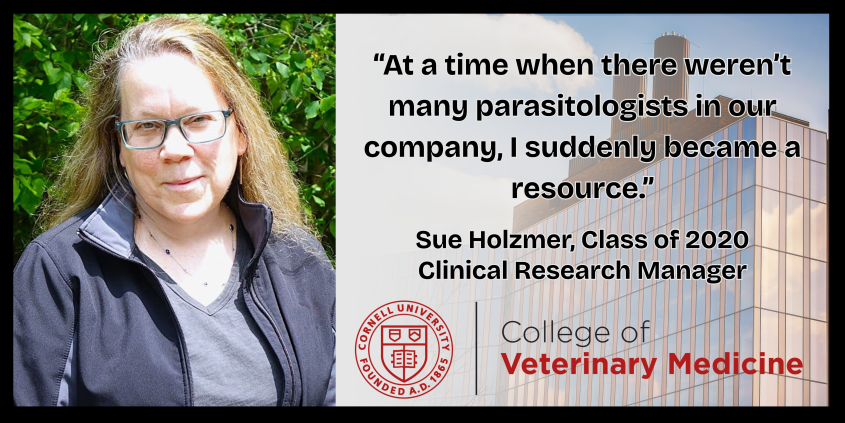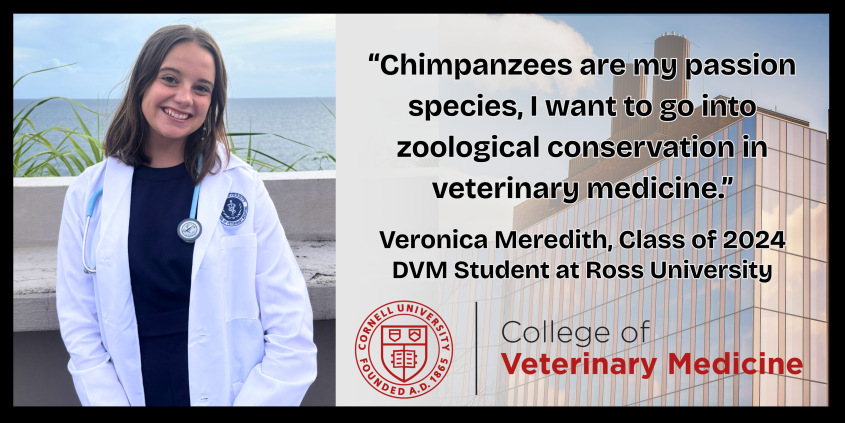Alumni
Alumni Spotlights

Sue Holzmer '20 – Spotlight
For as long as she could remember, Sue Holzmer was always drawn to animals. “I was the little kid doctoring the cat,” she said, reflecting on her childhood in the suburbs of NYC. “I ended up getting a horse when I was ten. I found a friend who had a barn in the backyard, and we kept her there for a few years. Bless my parents, I just had to have her!”
Her love for animals naturally drove her towards a career in veterinary medicine. Sue majored in Animal Science at the University of Connecticut and went on to become a Clinical Research Associate at Zoetis, an animal health company that specializes in vaccines, drugs, and other medical technologies for companion animals and livestock.
Sue’s career at Zoetis eventually led her to working with Dr. Dwight Bowman in 2011, who was on the verge of founding a one-of-a-kind degree program at Cornell. She was excited to collaborate with him, having been impressed by his distinguished career and contributions to parasitology globally.
“He came into a lab with us, and we hit it off immediately, chatting all day while he picked through worms. At the end of that very first day, I wished I could take some of his classes,” she said.
She’d soon have an opportunity to fulfill that wish. By working with people like Sue, Dr. Bowman sensed an unmet need for graduate education in parasitology, and in 2016 he established such a program at Cornell—the Master of Professional Studies in Veterinary Parasitology.
Sue remembered the exact moment she first heard about the program. “I was in an airport when I got an email announcing the MPS. I read the first five words and knew I had to do it! I started making my application in the airport that day.”
She would go on to be accepted into the first class of the MPS in Veterinary Parasitology. The program’s coursework was designed with busy professionals like Sue in mind: flexible online coursework paired with comprehensive in-person laboratories. This format turned out to be a perfect fit for her, allowing her to maintain her full-time career while furthering her education.
“I appreciated the hybrid format very much. It would have been impossible for me to take the classes otherwise,” Sue said. “The online courses are incredibly useful resources, even now. I still look through the slides to refresh my memory. I had an incredibly positive experience.”
As Sue progressed through the program, she realized her specialized knowledge in parasitology was beginning to set her apart from her colleagues.
“I was able to become a much more substantial team member on the projects I worked on. It was at a time where there weren’t many parasitologists in our company, I suddenly became a resource,” Sue recounted.
Eventually, Sue was promoted to Clinical Research Manager at Zoetis. In this role, she brought her expertise to teams developing antiparasitic drugs that have since been distributed nationwide. She’s worked on Simparica, a flea and tick oral medication for dogs, and Simparica Trio for internal and external parasites and heartworm prevention. She’s also contributed to Revolution and Revolution Plus for cats, a topical medication that prevents fleas, ticks, heartworms, and intestinal parasites in cats, as well as ProHeart 6 and ProHeart 12, long-acting heartworm preventatives for dogs.
To get these products through the FDA approval process, Sue designed and led clinical trials to prove their efficacy. She designed screens to test target parasites and used trials to discover molecules like sarolaner, the active ingredient in Simparica. Many of the skills she uses for her clinical work were gained in the MPS program, including necropsy, worm identification and parasite biology, which is something she “uses every day”.
Drug developers need to clear several hurdles to prove their medication does what it purports to do and getting it approved can take years of diligent research. Sue’s proudest professional achievement is the role she played in shepherding these products through approvals and onto shelves.
“It’s amazing to be blessed with that opportunity. Most scientists don’t even get the chance to do that once, and I have done it twice. When you read the label and it says in tiny little print 'this kills deer ticks', that was me!”

Veronica Meredith '24 – Spotlight
As soon as Veronica Meredith learned that zoos had in-house veterinarians, she knew she wanted to become one.
She had long considered parasitology as a possible avenue for her veterinary education—but enrolling in the Master of Professional Studies (MPS) in Veterinary Parasitology showed her just how deeply parasites impact every part of her dream career.
“I was able to see how it truly applied to everything I wanted to do,” she said. “In conservation settings, we overlook parasites, and then it becomes a bigger problem. For example, there were reports of lemurs getting Toxoplasma gondii that zookeepers didn’t know was in the environment. A whole troop of lemurs will pass away when it could have been prevented with testing and limiting exposure.”
Becoming qualified as a zoo vet requires extensive hands-on work experience. Due to the MPS program’s flexible online courses, Veronica was able to pursue fieldwork during her studies. She was employed as a primate zookeeper at Indianapolis Zoo, during which she was assigned to take care of the chimpanzees.
During a previous zoo internship, she found chimps intimidating. But once she was assigned to work with them directly, she soon became fascinated with their intelligence and complexity.
“They have their own society with unique sociological aspects, and working with them sparked something for me. They are unpredictable, but that’s what makes them the most fun,” she said.
Since then, Veronica has come to think of chimpanzees as her “passion species” and a focus of her future career. She hopes to study parasite and disease exposure in the future, specifically in great apes.
A related goal of hers is to contribute to general documentation of parasite prevalence, transmission and prevention methods. Conducting a literature review during the MPS program made her notice significant gaps in existing parasitology databases.
“There’s a lot more research to be done to know what can be passed and what the prevalence is in certain areas,” she explained. “There isn’t a complete collection of data, which was shocking to me. It would be really important for zookeepers to have this information, especially if you are moving animals from place to place.”
She cited a case in which captive great apes were being reintroduced into natural populations. The groups were set up in close proximity to each other, and this exposure led to unforeseen parasites being transmitted from one group to another.
Cases like this underscore the need for continued parasitological research. If researchers can achieve a broader understanding of parasite prevalence and transmission, these findings would empower animal health workers to make better informed decisions to protect wildlife.
Along with her asynchronous online coursework, Veronica also took in-person labs at Cornell. During these 1-week intensive courses, she learned valuable hands-on skills like preparing samples and identifying parasites in clinical specimens.
“The MPS gave me a great background on parasitology and pharmacology, going into my vet degree. With everything I learned, it’s easier to understand what I’m learning now because I have a solid foundation.”
Having gained field experience, lab skills and academic preparation, Veronica was well-prepared to head into the Doctor of Veterinary Medicine (DVM) program at Ross University. Once she’s earned her DVM, she plans to sit for the ACVP Parasitology boards—a credential she qualifies for thanks to her MPS degree. After that, she will continue pursuing a position as a zoo vet. Her sights remain set on safeguarding chimpanzees and general animal welfare from parasites and infectious diseases.


